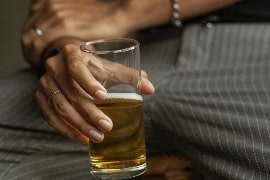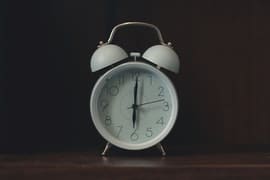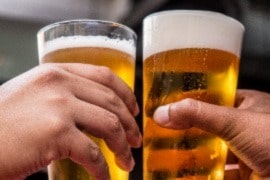While alcohol doesn’t necessarily make Diflucan less effective, there are other risks to combining these substances.
Article at a Glance:
Can you mix alcohol and Diflucan?
- No, you shouldn’t because there is the potential for liver toxicity and enhanced side effects when you combine alcohol and Diflucan.
- While alcohol doesn’t make Diflucan ineffective, it may further compromise your immune system when you’re trying to combat an infection.
What To Know About Alcohol and Diflucan
There are quite a few drugs that produce certain effects when they’re mixed with alcohol. One of those drugs is Diflucan. People frequently wonder about the effects of combining alcohol and Diflucan and whether alcohol makes Diflucan ineffective.
The following provides information on Diflucan, the effects of combining alcohol and Diflucan, and the answer to the question “does alcohol make Diflucan ineffective?”
What to Know About Alcohol and Diflucan
The general warning about alcohol and Diflucan is that you shouldn’t drink when using this drug.
One of the reasons it’s best to avoid combining alcohol and Diflucan is because, in some rare circumstances, Diflucan can cause serious liver problems. The risk of liver toxicity with alcohol and Diflucan isn’t common, but since it is possible, it’s important for patients to follow their physician’s warnings when taking Diflucan. People with liver diseases like cirrhosis and hepatitis should also not take Diflucan.
It’s also important to note that Diflucan has a long half-life, which means that you should make sure it’s completely eliminated from your system before drinking. Speak with your physician for more specific recommendations regarding alcohol and Diflucan.
What Is Diflucan?
Diflucan is the prescription brand name of the drug fluconazole, often used as an anti-fungal medicine. Diflucan is used to treat various fungal infections including vaginal, esophageal and oral infections. Diflucan can also be used to treat fungal urinary tract infections and cryptococcal meningitis. It can also help prevent Candida infections in people who are treated with radiation or chemotherapy before a bone marrow transplant.
Regardless of whether or not alcohol and Diflucan are combined, there are some possible side effects with the use of this drug. Common Diflucan side effects include nausea, abdominal pain, headache, dyspepsia, diarrhea, dizziness and rash. There are also some other possible serious but rare side effects, such as seizures and a reduced number of white blood cells and platelets.
Along with possible interactions with alcohol and Diflucan, which will be detailed below, this medicine can also interact with other drugs. Some of the drugs that may interact with Diflucan include rifampin, warfarin and erythromycin.
Does Alcohol Make Diflucan Ineffective?
So, while it’s not recommended that you mix alcohol and Diflucan because of the potential for liver toxicity and heightened symptoms, does alcohol make Diflucan ineffective?
A lot of people may ask this question because of a general myth that alcohol renders antibiotics ineffective. This is not the case, and mixing alcohol and Diflucan doesn’t make the medicine ineffective. It may cause adverse side effects, but ineffectiveness isn’t one of them.
Another reason people may wonder about if alcohol can make Diflucan ineffective is due to the effect that alcohol has on the immune system. When you drink, it weakens your immune system, so it may make it more difficult for you to get past the infection that led to your need for Diflucan in the first place. You may confuse this with alcohol making Diflucan ineffective when in reality, the medicine is just as effective as it would be ordinarily.
When you’re thinking about alcohol and Diflucan, it’s essential not just to consider the potential for enhanced side effects and liver toxicity, but also your body’s need to be strong to heal itself.
Articles Related to Alcoholism

Alcohol detox isn’t easy and not everyone can do it on their own. That is why alcohol detox and alcohol withdrawal treatment is administered by medical professionals.

Alcoholism takes many forms, and the stereotype doesn’t always hold true. So when do a few drinks with friends become a full-blown alcohol addiction? How do you know if you are an alcoholic?

While cirrhosis scars from excessive drinking are irreversible, quitting alcohol and leading a healthier lifestyle can help your liver heal from alcohol-related liver disease.

When detoxing, hydration is key. However, certain food groups also have benefits when it comes to helping with the discomfort of withdrawal symptoms and detoxification.

Detox from alcohol can begin within hours. Typically, alcohol withdrawal symptoms happen for heavier drinkers. Alcohol withdrawal can begin within hours of ending a drinking session.

Daily drinking can have serious consequences for a person’s health, both in the short- and long-term. Many of the effects of drinking every day can be reversed through early intervention.


The Recovery Village aims to improve the quality of life for people struggling with substance use or mental health disorder with fact-based content about the nature of behavioral health conditions, treatment options and their related outcomes. We publish material that is researched, cited, edited and reviewed by licensed medical professionals. The information we provide is not intended to be a substitute for professional medical advice, diagnosis or treatment. It should not be used in place of the advice of your physician or other qualified healthcare providers.